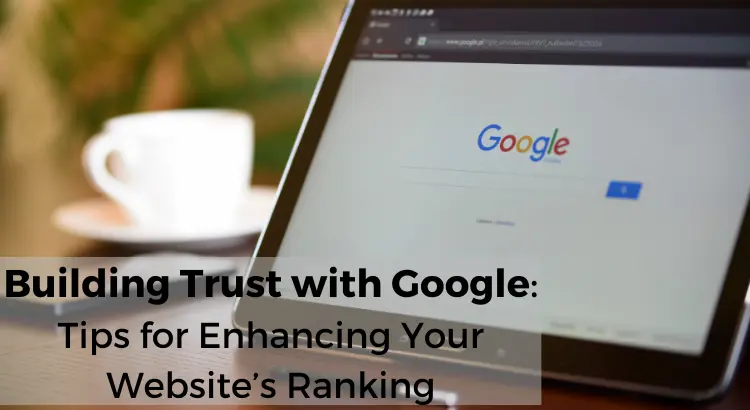In the fast-paced world of digital commerce and information sharing, establishing a powerful presence on the web is equivalent to securing a leading edge in your industry. One significant facet of this is ensuring a solid rapport with the undisputed titan of the search engine domain: Google. Your website’s ranking on this search engine propels your visibility and endorses your credibility to users worldwide.
Trust, a simple five-letter word, carries a weight that can potentially make or break a business or brand’s online success. In the realm of SEO, trust is a multifaceted gem that encapsulates aspects ranging from website security to quality content.
It’s no secret that Google’s algorithms are meticulously designed to favor websites that embody reliability and offer value to their users. Through fostering a relationship built on trust with Google, businesses stand to elevate their stature, attracting a more extensive and engaged audience.
This read serves to be more than just a guide; take it also as an invitation to elevate your online presence so you can have a website and, subsequently, an amplified online presence that’s both authentic and enduring.

Hire An Expert Web Agency
Mastering Search Engine Optimization (SEO), content strategy, and user experience is no small feat. This is where a web agency’s expertise, Client Sprint, among others, and seasoned insights can become your ally, bringing your website towards a fruitful relationship with Google.
In this regard, hiring an expert web agency isn’t merely an investment but a declaration of your commitment to excellence. These agencies bring a wealth of experience and a rich repository of industry insights that can catapult your website to higher Google rankings. They adopt a holistic approach, where every aspect of your website, from its structural design to content quality, is fine-tuned to resonate with Google’s expectations and user preferences.
Most importantly, a web agency’s expertise in analytics can help you navigate the shifting sands of user behavior and preferences, enabling you to make data-driven decisions that enhance your website’s visibility and credibility.
Related Post on Agencies:
Understand Your Online Customers
In the era of personalization and user-centric experiences, comprehending the needs and preferences of your online customers isn’t just beneficial but essential. The goal is to create a digital space where your audience feels seen, heard, and valued.
When your audience’s needs are met, their likelihood of spending more time on your website increases. In the long run, your website also stands to hold a competitive position where it becomes a trusted authority on the World Wide Web.

Understanding your online customers involves an intricate process of gathering and analyzing data to decode the patterns in user behavior and preferences. Employing tools such as Google Analytics can aid in defining a clear picture of your audience, thus enabling you to tailor your content, design, and strategies to resonate with them on a deeper level.
Publish Relevant, Authoritative Content
The basis of authoritative content lies in its roots of relevance and accuracy. In a digital space filled with information, standing out requires engaging content grounded in truth and expertise.
It necessitates a deep dive into industry research, a keen understanding of current trends, and a readiness to provide fresh and profound insights. With its sophisticated algorithms, Google has the knack to distinguish well-researched and reliable content, giving it the prominence it deserves in search results.
Furthermore, crafting relevant content is an ongoing dialogue between your brand and the audience. It involves a dynamic process of adapting to changing consumer needs and preferences. A focused approach, where content is designed to answer the pressing questions of your audience, solve their problems, and provide actionable insights, can foster a digital environment where relevance is maintained and celebrated.
Leverage Primary Keywords
Primary keywords function as the bridge that connects your content with the target audience’s search queries. These are the focal words or phrases that succinctly capture your content’s essence. The artistry lies in selecting keywords that aren’t only relevant but also resonate deeply with your audience’s language and search patterns, thereby enhancing the chances of your website appearing in the top tiers of Google’s search results.
Do note, however, that leveraging primary keywords is more than just an act of insertion at strategic points in your content. It’s about weaving these keywords seamlessly into your narrative, creating pieces where information flows organically and relevance is maintained.
Beyond the content’s body, these keywords should find a place in the meta descriptions, headers, and URLs, enhancing the cohesion and visibility of your content in the eyes of Google’s complex algorithms.

Moreover, it’s vital to approach this task with a balance, avoiding the pitfalls of keyword stuffing, which can potentially harm your website’s credibility and ranking. Google values authenticity and user-centric content, and the misuse of keywords can be perceived as an attempt to manipulate the system, thus negatively impacting your trustworthiness.
Therefore, the focus should be on creating content that naturally accommodates these keywords, fostering a symbiotic relationship between relevance and readability.

Improve Website Loading Speed
In the fast-paced digital world, patience is dwindling. Users expect swift, seamless access to information. A sluggish website not only dampens user experience but also sends negative signals to Google’s algorithms, which are finely tuned to prioritize sites that offer optimal user satisfaction.
Consequently, enhancing your website’s loading speed emerges as a vital strategy in retaining user interest and carving a favorable impression in Google’s evaluative parameters.
The journey to a faster website begins with a meticulous evaluation of its current status. Tools like Google’s PageSpeed Insights can offer invaluable data about your website’s performance, offering suggestions on areas that need refinement.
Optimizations may include compressing images, minimizing code, leveraging browser caching, and optimizing CSS delivery, among others. Implementing these optimizations ensures a leaner, more agile website.
Final Thoughts
With the ever-shifting sands of the digital landscape, fostering a firm foundation of trust with Google is critical to standout success. As you’ve seen throughout this guide, a harmonious relationship with Google can only be achieved through a multifaceted approach.
Most importantly, remember that building trust is a continuous, evolving process. Being adaptable, staying abreast with the latest updates, and persistently striving to enhance the user experience should be the core of all your efforts.